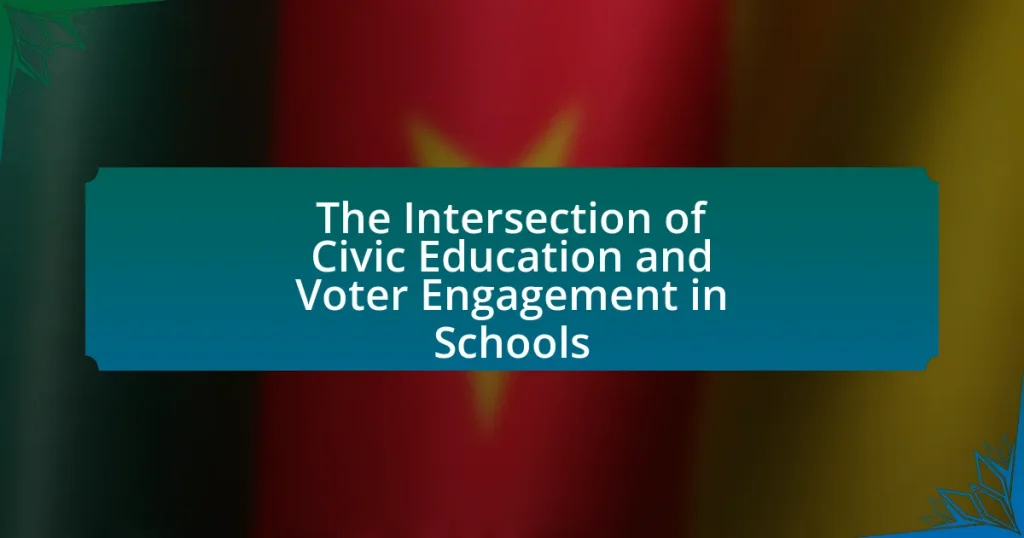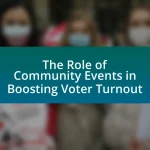The article examines the intersection of civic education and voter engagement in schools, highlighting how teaching students about their rights and responsibilities as citizens can enhance their participation in the electoral process. It discusses the key components of civic education, such as knowledge of government structures and civic rights, and outlines various voter engagement initiatives, including mock elections and community service projects. Research findings indicate that comprehensive civic education significantly increases the likelihood of students voting when they reach adulthood, emphasizing the importance of integrating civic education into school curricula to foster informed and active citizenship. Additionally, the article addresses current practices, challenges, and effective strategies for promoting civic education and voter engagement in educational settings.
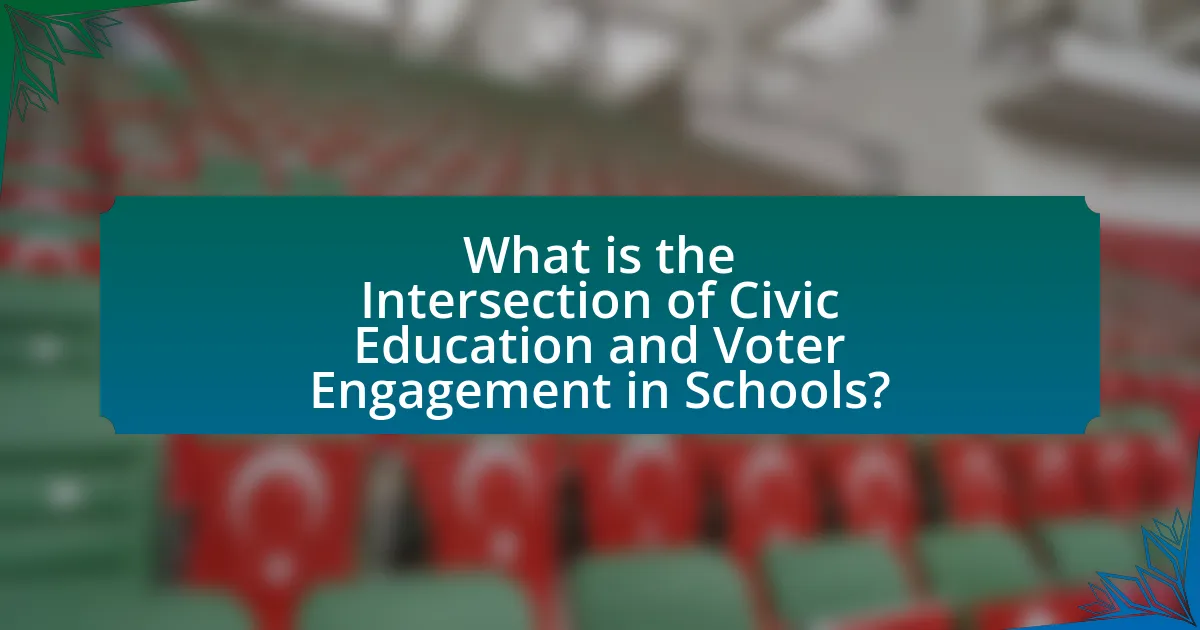
What is the Intersection of Civic Education and Voter Engagement in Schools?
The intersection of civic education and voter engagement in schools is the integration of teaching students about their rights and responsibilities as citizens with practical opportunities to participate in the electoral process. Civic education equips students with knowledge about government structures, democratic principles, and the importance of voting, while voter engagement initiatives encourage active participation in elections, such as organizing mock elections or voter registration drives. Research indicates that students who receive comprehensive civic education are more likely to vote when they reach voting age, as evidenced by a study from the Center for Information and Research on Civic Learning and Engagement, which found that civic education significantly increases the likelihood of young people participating in elections.
How do civic education and voter engagement relate to each other?
Civic education and voter engagement are closely related as civic education equips individuals with the knowledge and skills necessary to participate effectively in the democratic process, including voting. Research indicates that students who receive comprehensive civic education are more likely to engage in voting and other civic activities. For instance, a study by the Center for Information & Research on Civic Learning and Engagement found that high school students who participated in civic education programs were significantly more likely to vote in subsequent elections compared to their peers who did not receive such education. This demonstrates that civic education serves as a foundational element that fosters informed and active voter engagement.
What are the key components of civic education in schools?
The key components of civic education in schools include knowledge of government structures, understanding of civic rights and responsibilities, development of critical thinking skills, and engagement in community service. Knowledge of government structures equips students with an understanding of how local, state, and federal governments operate, which is essential for informed citizenship. Understanding civic rights and responsibilities helps students recognize their roles in a democratic society, including voting and participation in civic activities. Development of critical thinking skills enables students to analyze social and political issues effectively, fostering informed decision-making. Engagement in community service provides practical experience in civic involvement, reinforcing the importance of contributing to society. These components collectively prepare students for active participation in democracy and enhance voter engagement.
How does voter engagement manifest in educational settings?
Voter engagement in educational settings manifests through initiatives that promote civic education, encourage student participation in elections, and foster discussions about democratic processes. Schools implement programs such as mock elections, where students simulate the voting process, thereby increasing awareness and interest in real elections. Research indicates that students who participate in such activities are more likely to vote as adults; for instance, a study by the Center for Information & Research on Civic Learning and Engagement found that students involved in civic education programs are significantly more likely to engage in voting later in life. Additionally, schools often host debates and discussions on current political issues, which further cultivates critical thinking and civic responsibility among students.
Why is the intersection of civic education and voter engagement important?
The intersection of civic education and voter engagement is important because it fosters informed and active participation in democracy. Civic education equips individuals with the knowledge of their rights and responsibilities, while voter engagement encourages them to exercise those rights through voting. Research indicates that students who receive comprehensive civic education are more likely to vote and participate in civic activities; for instance, a study by the Center for Information & Research on Civic Learning and Engagement found that high school students who took a civics course were 3.5 times more likely to vote in the subsequent election compared to those who did not. This connection underscores the necessity of integrating civic education into school curricula to promote a more engaged and informed electorate.
What impact does civic education have on student voter turnout?
Civic education significantly increases student voter turnout by equipping students with the knowledge and skills necessary to engage in the electoral process. Studies indicate that students who receive comprehensive civic education are more likely to participate in elections; for instance, a report by the Center for Information & Research on Civic Learning and Engagement (CIRCLE) found that young people who had taken a civics course were 20% more likely to vote compared to those who had not. This correlation suggests that effective civic education fosters a sense of civic responsibility and awareness, ultimately leading to higher voter participation among students.
How does voter engagement enhance civic knowledge among students?
Voter engagement enhances civic knowledge among students by actively involving them in the democratic process, which fosters a deeper understanding of civic responsibilities and rights. When students participate in voting initiatives, they learn about the electoral system, the importance of their voice, and the impact of policies on their communities. Research indicates that students who engage in voter-related activities, such as mock elections or discussions about current events, demonstrate higher levels of civic knowledge and awareness. For instance, a study by the Center for Information and Research on Civic Learning and Engagement found that students who participated in civic activities were more likely to understand the significance of voting and the workings of government. This direct involvement not only informs students about the mechanics of democracy but also cultivates a sense of agency and responsibility towards civic participation.
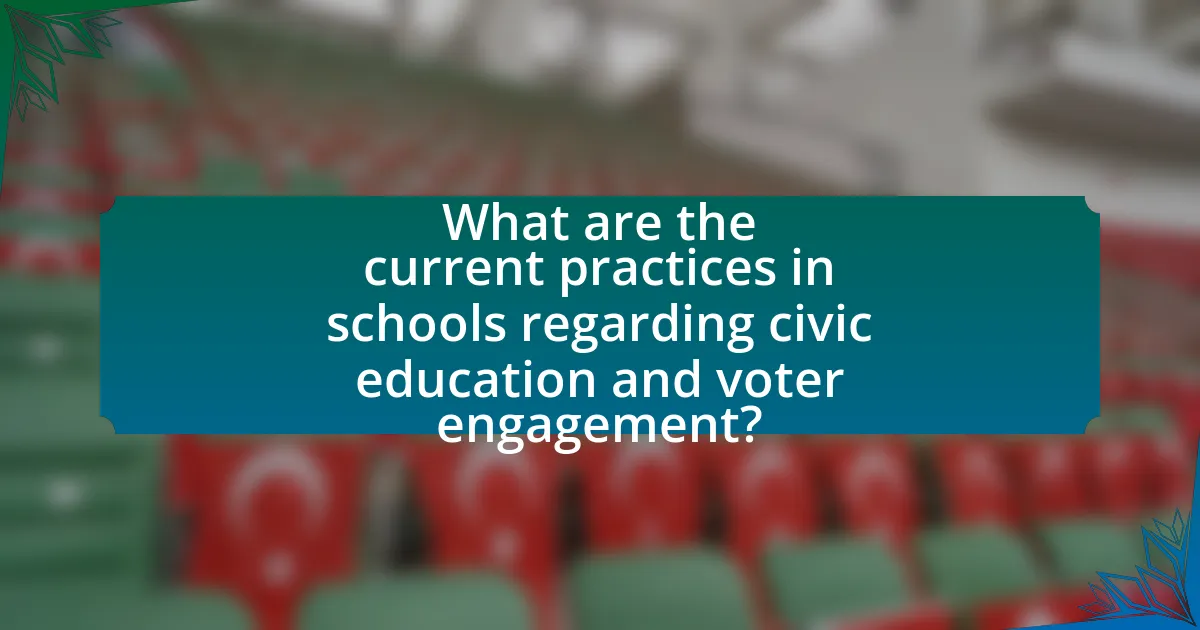
What are the current practices in schools regarding civic education and voter engagement?
Current practices in schools regarding civic education and voter engagement include integrating civic learning into the curriculum, promoting student participation in elections, and facilitating discussions on civic responsibilities. Many states have adopted laws requiring civic education as part of the social studies curriculum, emphasizing the importance of understanding democratic processes. For instance, the Center for Information & Research on Civic Learning and Engagement (CIRCLE) reports that schools are increasingly organizing mock elections and voter registration drives to engage students actively. Additionally, programs like “We the People” and “Civics for All” aim to enhance students’ knowledge of government and encourage them to participate in civic activities, thereby fostering a culture of informed and engaged citizenship.
How are schools implementing civic education programs?
Schools are implementing civic education programs through curriculum integration, experiential learning, and community engagement initiatives. Many educational institutions incorporate civic education into subjects like social studies and history, ensuring that students learn about government structures, civic responsibilities, and the electoral process. For instance, the Center for Information & Research on Civic Learning and Engagement (CIRCLE) reports that schools are increasingly adopting project-based learning, where students engage in real-world civic issues, fostering critical thinking and active participation. Additionally, schools often partner with local organizations to facilitate voter registration drives and mock elections, providing students with hands-on experience in the democratic process. These strategies collectively aim to enhance students’ understanding of civic duties and encourage informed voter engagement.
What types of civic education curricula are most effective?
Experiential and participatory civic education curricula are the most effective types. These curricula engage students through active participation in community service, simulations of democratic processes, and discussions on current events, which enhance their understanding of civic responsibilities and rights. Research indicates that programs incorporating service-learning and project-based learning significantly improve students’ civic knowledge and engagement levels, as evidenced by studies such as the “Civic Education Study” conducted by the Center for Information and Research on Civic Learning and Engagement, which found that students involved in experiential learning are more likely to vote and participate in civic activities.
How do schools encourage student participation in elections?
Schools encourage student participation in elections by integrating civic education into their curricula and organizing activities that promote awareness and engagement. For instance, many schools conduct mock elections, allowing students to experience the voting process firsthand, which fosters understanding and interest in real elections. Additionally, schools often host debates, invite guest speakers from the political sphere, and facilitate discussions on current events, all of which enhance students’ knowledge about the electoral process. Research indicates that students who participate in these activities are more likely to vote when they reach voting age, demonstrating the effectiveness of these educational strategies in promoting civic engagement.
What challenges do schools face in promoting civic education and voter engagement?
Schools face significant challenges in promoting civic education and voter engagement, primarily due to limited resources, varying state mandates, and a lack of trained educators. Limited funding often restricts the development of comprehensive civic education programs, resulting in inadequate curriculum and materials. Additionally, state mandates for civic education differ widely, leading to inconsistencies in what is taught across different regions. Furthermore, many educators lack specific training in civic education, which can hinder effective teaching and engagement strategies. According to a report by the Center for Information & Research on Civic Learning and Engagement, only 27% of high school students reported receiving a course in civics or government, highlighting the gap in civic education.
What barriers exist to effective civic education in schools?
Barriers to effective civic education in schools include a lack of trained educators, insufficient curriculum resources, and limited time allocated for civic instruction. Many teachers report feeling unprepared to teach civic education due to inadequate training, which affects the quality of instruction. Additionally, civic education often competes with other subjects for classroom time, leading to reduced emphasis on civic topics. Research from the Center for Information & Research on Civic Learning and Engagement (CIRCLE) indicates that only 27% of high school students reported receiving a high-quality civic education, highlighting the systemic issues that hinder effective implementation.
How can schools overcome obstacles to voter engagement?
Schools can overcome obstacles to voter engagement by implementing comprehensive civic education programs that emphasize the importance of voting and provide practical resources for students. Research indicates that students who receive structured civic education are more likely to participate in elections; for instance, a study by the Center for Information & Research on Civic Learning and Engagement found that high school students who took a civics course were 3.5 times more likely to vote than those who did not. Additionally, schools can facilitate voter registration drives and partnerships with local organizations to ensure students have access to the necessary information and tools to engage in the electoral process. By fostering an environment that prioritizes civic responsibility, schools can effectively enhance voter engagement among their students.
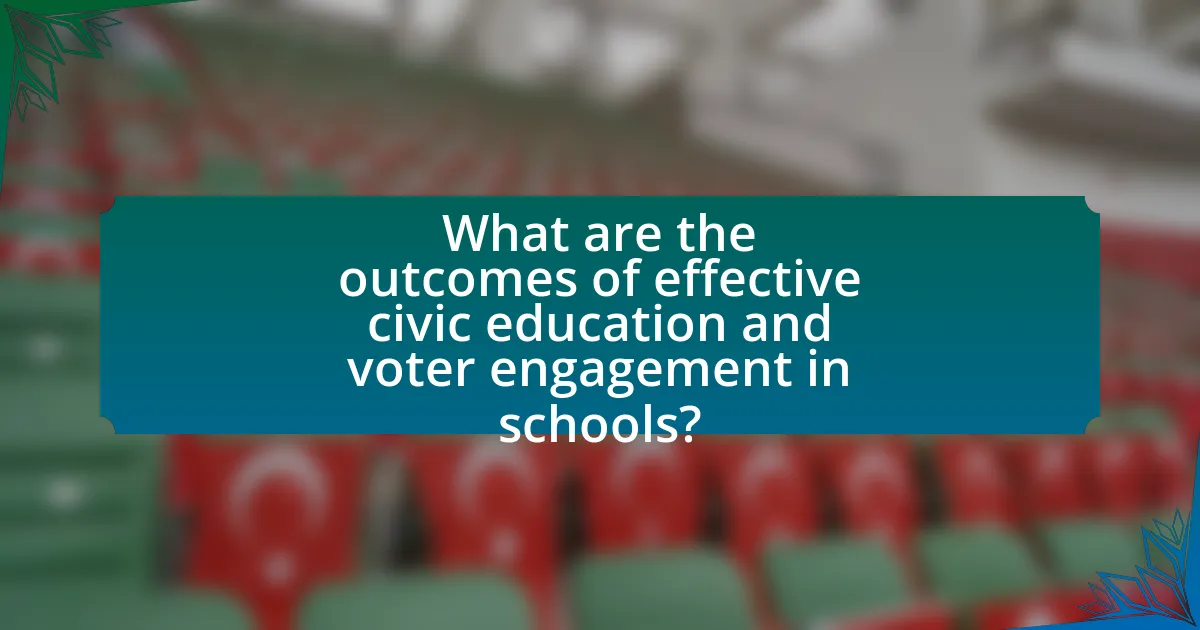
What are the outcomes of effective civic education and voter engagement in schools?
Effective civic education and voter engagement in schools lead to increased civic knowledge, higher voter turnout, and enhanced civic participation among students. Research indicates that students who receive comprehensive civic education are more likely to understand democratic processes and the importance of their participation in elections. For instance, a study by the Center for Information & Research on Civic Learning and Engagement (CIRCLE) found that students who participated in civic education programs were 20% more likely to vote in their first election compared to those who did not receive such education. Additionally, effective civic education fosters critical thinking and encourages students to engage in community service, further strengthening their commitment to civic responsibilities.
How does civic education influence students’ civic behaviors post-graduation?
Civic education significantly influences students’ civic behaviors post-graduation by equipping them with the knowledge, skills, and attitudes necessary for active participation in democratic processes. Research indicates that students who receive comprehensive civic education are more likely to engage in voting, community service, and political discussions after graduation. For instance, a study by the Center for Information and Research on Civic Learning and Engagement (CIRCLE) found that high school students who participated in civic education programs were 20% more likely to vote in subsequent elections compared to their peers who did not receive such education. This correlation underscores the role of civic education in fostering a sense of civic responsibility and encouraging lifelong engagement in civic activities.
What evidence exists linking civic education to lifelong voting habits?
Civic education is linked to lifelong voting habits through various studies demonstrating that individuals who receive civic education are more likely to participate in elections throughout their lives. For instance, research conducted by the Center for Information and Research on Civic Learning and Engagement (CIRCLE) indicates that students who engage in civic education programs are 20% more likely to vote as young adults compared to those who do not receive such education. Additionally, a longitudinal study published in the Journal of Political Science Education found that civic education fosters a sense of civic duty and political efficacy, which are critical factors influencing voting behavior over time. These findings collectively support the assertion that civic education plays a significant role in cultivating lifelong voting habits.
How do engaged students contribute to their communities?
Engaged students contribute to their communities by actively participating in civic activities, volunteering, and advocating for social issues. Their involvement fosters a sense of responsibility and awareness, leading to initiatives that address local needs, such as organizing community service projects or participating in local governance. Research indicates that students who engage in civic education are more likely to vote and influence their peers, as demonstrated in a study by the Center for Information and Research on Civic Learning and Engagement, which found that students involved in civic activities are 50% more likely to vote in elections. This active participation not only enhances their personal development but also strengthens community ties and promotes a culture of civic responsibility.
What best practices can schools adopt to enhance civic education and voter engagement?
Schools can enhance civic education and voter engagement by implementing experiential learning opportunities, such as mock elections and community service projects. These practices actively involve students in the democratic process, fostering a deeper understanding of civic responsibilities. Research indicates that students who participate in mock elections are more likely to vote in real elections; for instance, a study by the Center for Information & Research on Civic Learning and Engagement found that students engaged in such activities showed a 20% increase in voter turnout compared to their peers. Additionally, integrating discussions on current events and encouraging critical thinking about civic issues can further empower students to engage meaningfully in their communities and the electoral process.
What role do community partnerships play in civic education?
Community partnerships play a crucial role in civic education by providing resources, expertise, and real-world experiences that enhance students’ understanding of civic responsibilities. These partnerships often involve collaboration between schools, local governments, non-profit organizations, and community leaders, which can lead to practical learning opportunities such as service projects, civic engagement initiatives, and discussions on local governance. For instance, research indicates that students who participate in community-based civic education programs demonstrate higher levels of civic knowledge and engagement, as evidenced by increased voter turnout and participation in local events. This collaborative approach not only enriches the educational experience but also fosters a sense of belonging and responsibility among students, preparing them to be active participants in their communities.
How can technology be leveraged to improve voter engagement among students?
Technology can be leveraged to improve voter engagement among students by utilizing digital platforms for education, outreach, and participation. For instance, online tools such as interactive websites and mobile applications can provide students with information about the voting process, including registration, polling locations, and candidate platforms. Research indicates that students who engage with digital civic education resources are more likely to participate in elections; a study by the Center for Information & Research on Civic Learning and Engagement found that students exposed to technology-driven civic education initiatives showed a 20% increase in voter turnout compared to those who did not have access to such resources. Additionally, social media campaigns can foster discussions around civic issues, encouraging students to express their opinions and mobilize their peers.
What resources are available for schools to improve civic education and voter engagement?
Schools can access various resources to enhance civic education and voter engagement, including curriculum guides, online platforms, and community partnerships. Organizations like the Center for Civic Education provide comprehensive curriculum materials that focus on democratic principles and civic responsibilities. Additionally, platforms such as iCivics offer interactive games and lesson plans designed to engage students in the electoral process. Community partnerships with local civic organizations can also facilitate workshops and events that promote voter registration and participation. These resources collectively support schools in fostering informed and active citizenship among students.
What organizations provide support for civic education initiatives?
Organizations that provide support for civic education initiatives include the Center for Civic Education, the National Council for the Social Studies, and the League of Women Voters. The Center for Civic Education develops programs and resources aimed at enhancing civic knowledge and engagement among students, while the National Council for the Social Studies offers professional development and curriculum resources for educators. The League of Women Voters focuses on promoting informed and active participation in government and influences civic education through advocacy and educational programs. These organizations contribute significantly to fostering civic understanding and engagement in schools.
How can educators access training for effective civic engagement strategies?
Educators can access training for effective civic engagement strategies through professional development programs offered by educational institutions, non-profit organizations, and government agencies. These programs often include workshops, online courses, and resources specifically designed to enhance educators’ skills in teaching civic responsibility and promoting voter engagement among students. For example, organizations like the National Council for the Social Studies provide resources and training opportunities that focus on civic education. Additionally, state education departments frequently offer training sessions that align with civic engagement standards, ensuring that educators are equipped with the latest strategies and best practices in the field.
